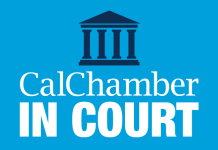Governor Edmund G. Brown Jr. recently vetoed a former job killer bill that would have prohibited use of release clauses, thereby discouraging parties from settling their differences instead of filing lawsuits.
AB 2748 (Gatto; D-Glendale) would have eliminated incentives to settle lawsuits and instead exposed businesses to multiple rounds of litigation at great expense to the parties and the courts by creating statutory prohibitions on “release” clauses in settlements pertaining to “environmental disasters.”
The California Chamber of Commerce removed the job killer tag on AB 2748 due to June 2 amendments, which made clarifications and narrowed the bill to apply only to the Porter Ranch area gas leak or to contamination surrounding the Exide Technologies facility, but CalChamber remained opposed.
Although CalChamber appreciated the author’s willingness to substantially narrow the scope of the bill, AB 2748’s statutory prohibition on “release” clauses in settlements pertaining to these facilities would have set a troublesome precedent. California’s public policy has long been to encourage settlement over litigation in the interests of efficiency and economy for the courts and for the parties involved.
In fact, the State of California, local municipalities, and private entities routinely insert the very “release” clauses in their settlements that AB 2748 sought to prohibit for Porter Ranch and Exide. If the policy that AB 2748 seeks to endorse were to be applied more broadly in the future, the State of California would have encouraged litigation over settlements and required otherwise resolvable claims to be fully litigated at great expense to the parties, the courts, and the public.
Governor Brown agreed with CalChamber’s concerns, writing in his veto message that AB 2748 “could eliminate the incentive for defendants to settle legal disputes…something that clearly is not in the public interest.” The Governor continued, “Nothing has been shown to indicate that current law is insufficient to hold polluters accountable.”
Release clauses are one of the primary incentives for defendants to settle disputes and avoid prolonged, expensive litigation. Indeed, California law and case law both recognize the ability for parties to contract to extinguish claims. The Civil Code also states that a general release does not extend to claims which the person granting the release does not know or suspect to exist in his or her favor at the time of executing the release . Notwithstanding this provision, parties to a dispute are permitted to agree to waive the protections of Civil Code Section 1542, which must be accompanied by evidence that the releasing party intended to release unknown claims.
It is critical to preserve litigants’ ability to waive Section 1542 to maximize the potential to settle litigation. When a business settles a claim with a party, the business should have certainty that the same party will not sue the business the day after a settlement is reached regarding a claim that could have been raised at the time of settlement. Yet, AB 2748, as it pertained to Porter Ranch and Exide, would have essentially assured such an outcome, thereby eliminating the incentive to settle. Accordingly, CalChamber opposed AB 2748 out of concern that the bill would have set a precedent for future attempts to impose these types of restrictions on parties’ ability to settle.
Governor Brown closed his veto message by explaining that AB 2478 is unnecessary, pointing to “the many direct enforcement actions and lawsuits that have been filed on behalf of the state and affected communities.
The Governor has until September 30 to sign or veto any legislation remaining on his desk.


